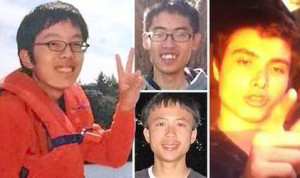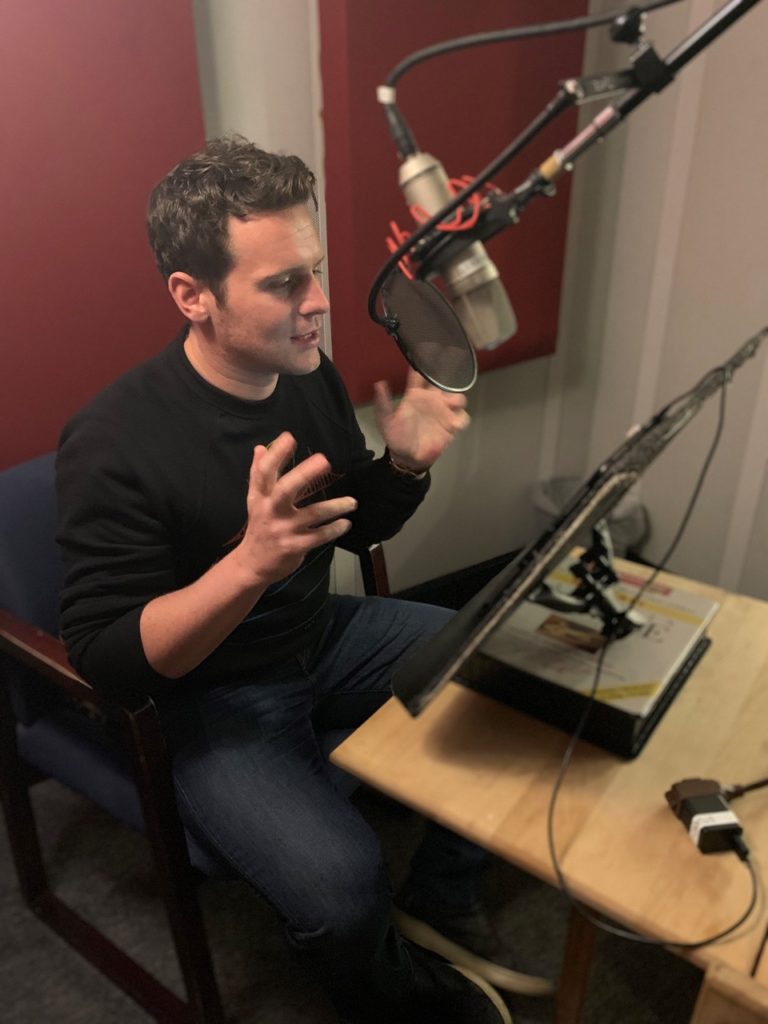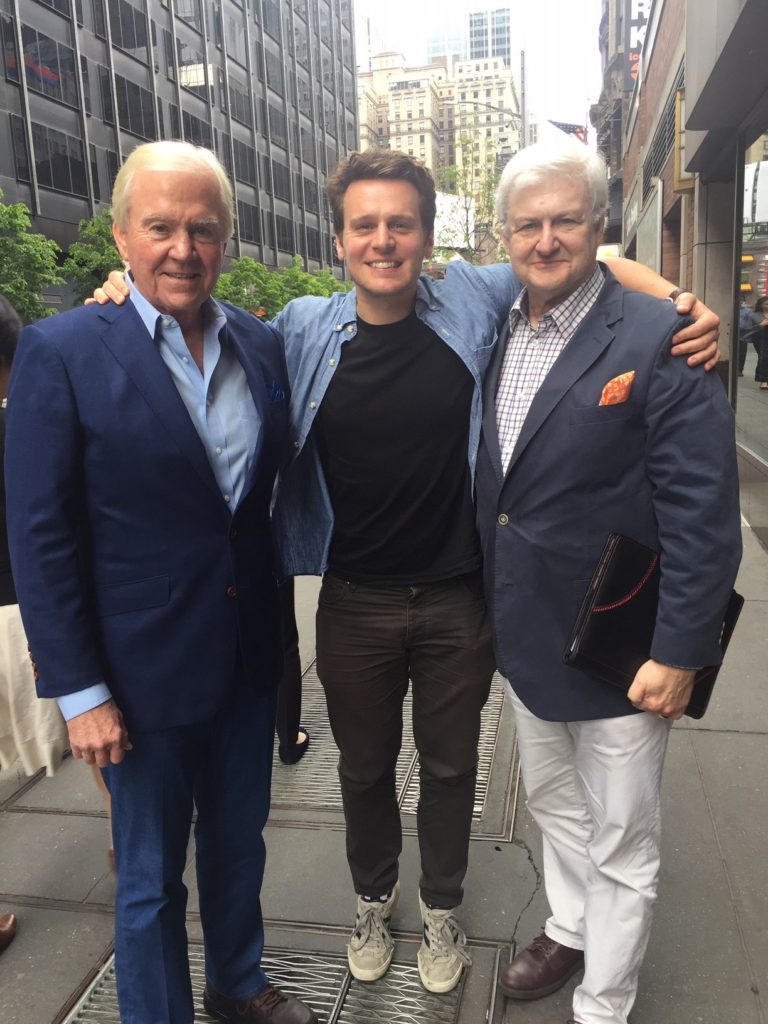
Elliot Rodger (right) and his first three victims: Weihan Wang (left), Cheng Yuan Hong (top center) and George Chen (center bottom) from The Daily Express
Families of Elliot Rodger’s first three victims – his two roommates and the young man who happened to be visiting at the time – have expressed outrage and dismay over the media’s focus on the depraved killer rather than on his victims. On May 23, Rodger stabbed and hacked to death Cheng Yuan “James” Hong and Weihan “David” Wang, both 20, who shared the apartment with Rodger, and George Chen, 19. He then went out in his BMW on a shooting spree in Isla Vista, California.
Their survivors particularly resent the fact that Barbara Walters is coming out of her recent retirement to interview the killer’s father. In a statement to ABC News, they wrote: “As parents, we plea you not to focus on the killer side.” Instead, they asked the network to “pay respect to the six beautiful lives gone too soon.”
Do the parents have a legitimate gripe? They definitely do.
But is the focus on the killer understandable? That’s also a “Yes.”
It is true that we tend to focus more on the perpetrators than the victims. Part of this phenomenon certainly derives from the same emotional core that motivates us to watch horror movies and read crime novels – the vicarious experiencing of things that are too horrible to contemplate as actually applied to ourselves. But there is another, more profound explanation, which gets to the heart of why people like me write about true crime and the justice system that attempts to deal with it.
Permit me to go a little “inside baseball” on the writerly craft.
How do you define character as a writer? You can list a bunch of traits, but that is lazy and boring. In scriptwriting, it is frowned upon as writing “on the nose” as opposed to showing the person in action. So when writers think about showing character, they do so by considering the choices the individual makes. In other words, to quote an old writing maxim, Character is choice.
In a crime, it is the perpetrator who makes the choice. He is the active participant in the drama. The victim may then be presented with a series of choices, but it is the perpetrator who initiates the action.
And what we all want to know is: Why?
Those of us who consider ourselves relatively “normal” (whatever that means), understand the victim or victims. They are us. The horror that happened to them could happen to any of us. We can “fill in the blanks” in their lives and instinctively feel their pain – or at least we should.
But as human beings, we are inexorably drawn to mystery. As Robert Penn Warren put it so plainly in his magnificent novel, All the King’s Men, “The end of man is to know.”
The perpetrator represents the mystery of evil. He has chosen to do something we can’t imagine doing ourselves. We understand his anger, jealousy, hatred, rage, resentment and/or sense of inadequacy, because we’ve all felt those emotions. What we can’t understand is the inability or unwillingness to suppress those emotions to the point of wantonly injuring someone else or taking a life.
We tell ourselves that we understand, but we really don’t. If we did, we might be able to recognize the evil and stop it before it happens – something we ask about each time there is another mass murder.
Any time a victim is marginalized or forgotten, a terrible injustice takes place. But it is unreasonable to expect us not to be interested in the perpetrator. Because the choice of evil is probably the greatest mystery there is.



























Hello:
I remember the book, “Looking For Mr. Goodbar.” That was fiction. The true story was much sadder, and I think that book is still around, if anyone is interested.
Jennifer G.
Issaquah, Washington
Your comment, “We tell ourselves that we understand, but we really don’t. If we did, we might be able to recognize the evil and stop it before it happens …” encapsulates, I think, a lot of people’s continued interest in the subject of mass murderers and serial killers. If the study of these criminals have taught us nothing else, it is anyone could be a victim. Any of us can fit a ‘type’. Since we cannot control this, we try to find control by identifying them.
It fascinates me. How evil or those who choose to do evil things becomes a target of interest. What is at work? I think what is posited in this article, that people want to understand how the killer or rapist can take normal emotions and take them to a level of harming others, is part of the reason why people are fascinated by these individuals. I think that boredom with one’s own life and seeing these individuals as living out their sick fantasies also piques the interest of others-and this, unfortunately, is not uncommon in any which way. When you see a watch movie, you want to see a good villain. The villain usually makes the movie better…the unfortunate thing is that this psychological phenomena is translated into the morbid curiosity into real life villains, the real life killer or rapist or guy who rips off people on Wall Street. In my own life, my father was a sociopath and did many bad things to myself and my mother. He did nothing but harm and chose evil actions. I tell people who were friends of his about this and even show evidence of some of the atrocities be engaged in, but people still refuse to believe in what he was. It is disgusting, but I realize people never want to admit to being duped. It just makes me so sad and confused that people have such curiosity into the lives of those who commit such atrocities. Realize that these people, these sociopaths, are just CHOOSING to be bad people. There is no magic and mystery. Some of them had great upbringings without abuse and some were beaten daily and had, maybe, a prostitute as a parent. But, remember, there are just as many people out there that had awful backgrounds that CHOSE better things in their lives. These are bad people making bad decisions.
I can’t speak for others, but my interest is more on understanding why. Is it nature? Is it nurture? Is it a combination of both? Although I agree it boils down to choice, why is it easier for some to transition to that choice when others don’t? Why don’t they have that empathy? To me simply remembering the victim is not enough. We need to honor them by trying to prevent or at least minimize others becoming victimized. Otherwise, it feels like we are saying, “sorry this happened to you…oh look, cake!” It’s just empty.
This dovetails so beautifully with what we were discussing in writing seminar this morning. One of the participants–a teacher who doesn’t write–asked why so few writers focus on happy stories. The visiting instructor just shrugged and said, “because happy is boring. Conflict is what we crave.” While that’s obviously not an exact parallel to why we are interested in murderers and tend to overlook the victims, it’s certainly a starting point for examining the idea.
As Tolstoy wrote in ANNA KARENINA,“All happy families are alike; each unhappy family is unhappy in its own way.”
That is the essence of literature.
BTW – Thanks, Mark. You always make me think.
Fitzgerald got it right with the “Action is character,” in terms of how does one, as a writer, convey personhood (person-ness?). As individuals, however, does anyone remember the book “Looking for Mr. Goodbar”? Its focus on the victim and her perspective was profoundly disturbing, and it appeared to be difficult for the author to stay away from blaming the victim. It confronted our voyeurism in a different way. Yes, we could all be victims, but focusing on that (apologies to the families, this is about literary device, not life) is traumatic for the reader in a way that following the perp is not. As the kids say, “It’s complicated.” Mental illness is fascinating and repulsive at the same time. Just as we complain about gawkers at an accident site, we are also craning our heads to see what is there, praying a silent thanks that it didn’t happen to us.
Thanks, Naomi. Very insightful comments.
Sometimes you have people who show some compassion in certain areas in but are brutal in others. Edmund Kemper is a interesting case. Mr Douglas has mentioned him in his books. Is it true Kemper has waived his rights for parole every time?
I get 3 of the History channels on my TV. This article is a reminder that hardly a night goes by when Hitler is not on at least one of them.
“Because the choice of evil is probably the greatest mystery there is.” – I think that’s very true.
I think a lot of people do get a vicarious thrill out of the crime – I really love heist movies for that reason – but I really think many people wonder about this.
Killers have brothers and sisters from the same house who aren’t killers. Sometimes someone can start doing wrongful acts and change, like Malcolm X. Sometimes someone can be really kind and wonderful to one person and unimaginably evil to another.
It’s the biggest and oldest mystery in the world. What causes evil?